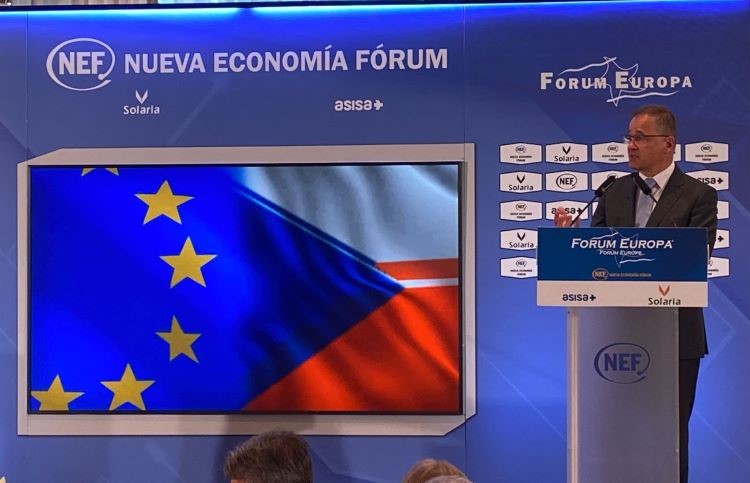The Diplomat
The Czech Republic’s Ambassador to Spain, Ivan Jancarek, said yesterday that one of the objectives of the current Czech Presidency of the Council of the European Union is to “accelerate negotiations” on trade with “third partners” from other areas of the world, such as Latin America.
During his speech at Forum Europe, an informative meeting organized by New Economy Forum in Madrid, the ambassador explained the measures being studied by his government, in its capacity as rotating Presidency of the EU, to address “the consequences of the war” in Ukraine on European economies. “The first thing is coordination, since we are in a single market” and, if any State adopts measures on its own, “this will ultimately affect the entire European Union,” he warned.
Within this framework of coordination, he continued, “we are going to talk about what measures we can take that do not harm the economic situation in other countries” and we are going to try to “improve the single market, because it is the only tool that exists in the European Union so that we can increase our economic growth”.
Another of the objectives of the Czech Presidency, according to Jancarek, is to face the “challenges in the commercial area, because Europe is only 440 million people”, an insufficient number to satisfy European commercial needs. Therefore, “we must have a base of friendly countries that negotiate with us and also open up to the world for free trade”, which implies, on the one hand, “thinking about how to speed up negotiations with third partners”, in particular “with Australia, with Latin American countries, with Chile and Mexico“, and, on the other hand, “taking care of our relations with our largest partner, which is the United States”.
The need to make progress in the EU’s trade negotiations with Latin America is one of the great obsessions of the Spanish government, which has insisted on numerous occasions that one of the main objectives of the Spanish Presidency of the Council of the EU (which will take place in the second half of 2023) will be precisely to reactivate the political dialogue at the highest level between the EU and the Community of Latin American and Caribbean States (CELAC) and to conclude the agreements with Mercosur, Chile and Mexico. Exactly one year ago, the Minister of Foreign Affairs, José Manuel Albares, and the EU High Representative for Foreign and Security Policy and Vice-President of the Commission, Josep Borrell, agreed during a meeting in Madrid on the importance of “making progress in the approval of trade agreements with Mexico, Chile and, in particular, Mercosur”.
Energy dependence
On the other hand, the ambassador acknowledged his country’s enormous energy dependence on Russia (the Czech Republic and Latvia depend entirely on gas from the Russian Federation), which represents a “security problem” that will make it necessary to look for other suppliers. “The first possibility is with the United States,” while the rest of the supply can be obtained “through diversification with other suppliers, such as Qatar, Mozambique or Algeria,” he continued.
“We are not going to do this from one day to the next, overnight,” and, for this reason, it is necessary, in the “long term,” to invest in renewable energies and promote “a new base for the green economy in the European Union.” However, until this point is reached, “we cannot leave out the old energies”, such as coal, gas or nuclear energy, because “Europe is based on industry and for industry we need energy, and if we do not have it we will not have production, we will not have jobs for our populations”. For this reason, Jancarek was “very satisfied” with the European Parliament’s decision to approve “the Commission’s proposal on taxonomies”, in which gas and nuclear are maintained within the ‘green’ energies.
As for the international situation, Ivan Jancarek warned that the EU has “a moral obligation” to continue “supporting the Ukrainians with military supplies, with economic aid and also with humanitarian aid” in the face of Russian military aggression and recalled that currently “there are more than five million refugees in all member states”. In any case, the EU has to “think about how to create the possibilities” for refugees to return to their country, for which “they clearly need a Ukraine that is a little more reconstructed than it is now.” “We have to think about how to rebuild Ukraine, it’s our duty,” he warned.
During the presentation of the event, the State Secretary for Trade, Xiana Méndez, recalled that Ambassador Ivan Jancarek “has a long career” after having worked “in different positions in Embassies in different regions, from Mozambique to South Africa, Sweden, Denmark, Brazil or Venezuela, which has allowed him to have a very broad vision of politics, of the world economy” and “also of multilateral and bilateral relations”.







